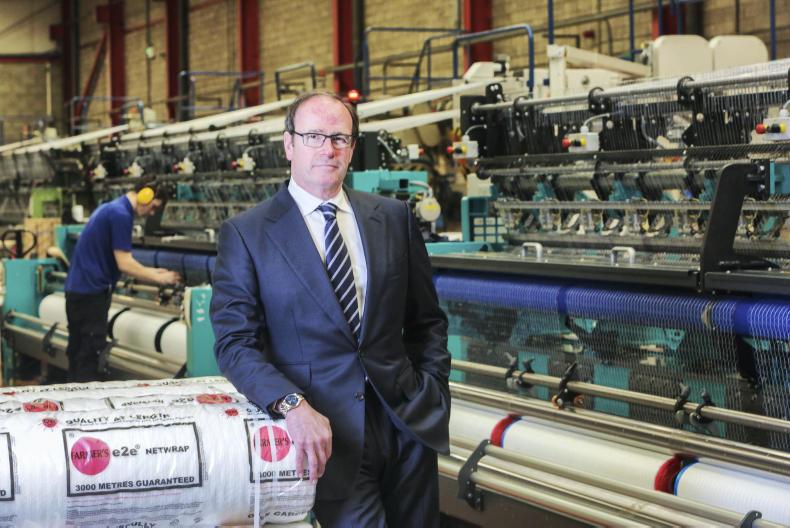Is there a difference in the quality of silage wraps?
In the early years, yes, but this gap has closed thanks to more uniform manufacturing equipment. There is a drive to produce silage films which offer more value in terms of thickness and extended lengths. Ultimately, every farmer wants a premium wrapped bale of silage – one that will be secure throughout the winter.
What makes a good-quality silage wrap?
A good quality silage wrap forms a protective layer which is impermeable to moisture and air. It offers good adhesion between layers and superior stretch properties in all weather conditions. The silage wrap must be able to withstand the tension of wrapping and maintain strength over time until the bale is used.
What is your most popular product?
Interestingly, one of our basic net wraps, the 3,000m Farmer’s e2e net wrap, has increased a lot in popularity recently. It appears that consistency and value are big selling points as farmers aim to control their input costs as much as possible.
What is your view on new
technologies?
We would keep aware of projects and communicate with our customers worldwide. Crop conditions and local practices usually determine the rate of success for new technology. Currently, all-in-one net and plastic product represents just 3% of the world market – it is very expensive and heavy to handle, and in some instances it has met peak application early.
Are low oil prices reflected in the price of plastics?
Sadly not. We wish they were as price movements would be transparent. On the whole, oil companies no longer produce plastic products – they have customers who do that now. Typically the feed stock is no longer oil but now natural gas or ethane which is processed directly. Plastic should be cheaper, but it’s not feeding through as its distribution is tightly controlled.
Where are your most important emerging markets?
As political stability and investment flows are producing return on crops, areas such as Pakistan and Uzbekistan, and Central and Eastern Europe, are becoming important emerging markets with improved local knowledge and lower land costs.
Do you have concerns over Brexit?
After the initial shock of the Brexit vote result, we quickly returned to the practicalities of doing business and planning for the future as far as possible. Thankfully we have very strong relationships with our major European distributors and we think once the rhetoric and elections are passed, sense and stability will prevail. Yes, big business impacts global activity, but the backbone of business is small and medium sized enterprises.
Is there a difference in the quality of silage wraps?
In the early years, yes, but this gap has closed thanks to more uniform manufacturing equipment. There is a drive to produce silage films which offer more value in terms of thickness and extended lengths. Ultimately, every farmer wants a premium wrapped bale of silage – one that will be secure throughout the winter.
What makes a good-quality silage wrap?
A good quality silage wrap forms a protective layer which is impermeable to moisture and air. It offers good adhesion between layers and superior stretch properties in all weather conditions. The silage wrap must be able to withstand the tension of wrapping and maintain strength over time until the bale is used.
What is your most popular product?
Interestingly, one of our basic net wraps, the 3,000m Farmer’s e2e net wrap, has increased a lot in popularity recently. It appears that consistency and value are big selling points as farmers aim to control their input costs as much as possible.
What is your view on new
technologies?
We would keep aware of projects and communicate with our customers worldwide. Crop conditions and local practices usually determine the rate of success for new technology. Currently, all-in-one net and plastic product represents just 3% of the world market – it is very expensive and heavy to handle, and in some instances it has met peak application early.
Are low oil prices reflected in the price of plastics?
Sadly not. We wish they were as price movements would be transparent. On the whole, oil companies no longer produce plastic products – they have customers who do that now. Typically the feed stock is no longer oil but now natural gas or ethane which is processed directly. Plastic should be cheaper, but it’s not feeding through as its distribution is tightly controlled.
Where are your most important emerging markets?
As political stability and investment flows are producing return on crops, areas such as Pakistan and Uzbekistan, and Central and Eastern Europe, are becoming important emerging markets with improved local knowledge and lower land costs.
Do you have concerns over Brexit?
After the initial shock of the Brexit vote result, we quickly returned to the practicalities of doing business and planning for the future as far as possible. Thankfully we have very strong relationships with our major European distributors and we think once the rhetoric and elections are passed, sense and stability will prevail. Yes, big business impacts global activity, but the backbone of business is small and medium sized enterprises.
Title: Chief executive, UPU Industries.Turnover: € 19m.Products: Farmer’s bale netting, silage wrap and baler twines; ReflectorNet ventilated pallet wrapping products. Locations: Dromore, Northern Ireland and Kansas, USA.Key export markets: Europe, North America and Australasia. 





 This is a subscriber-only article
This is a subscriber-only article










SHARING OPTIONS: